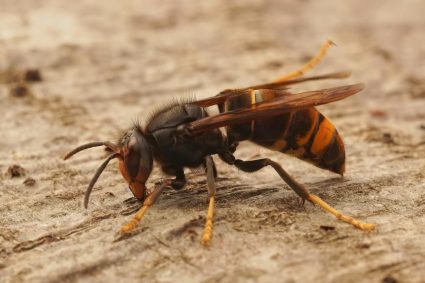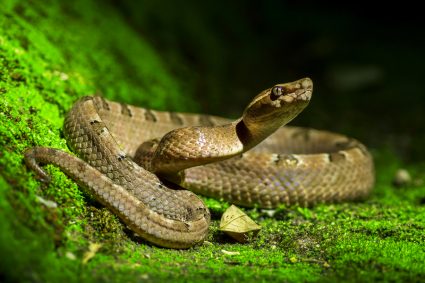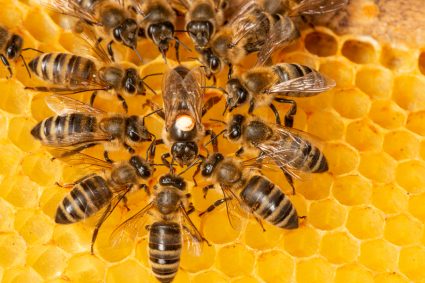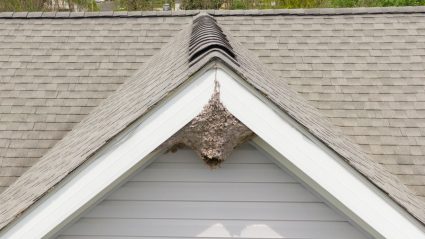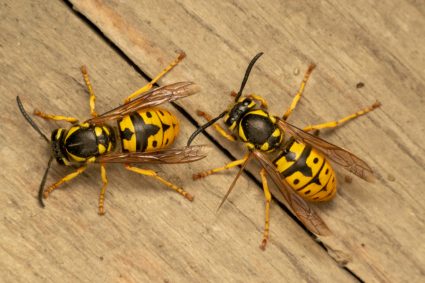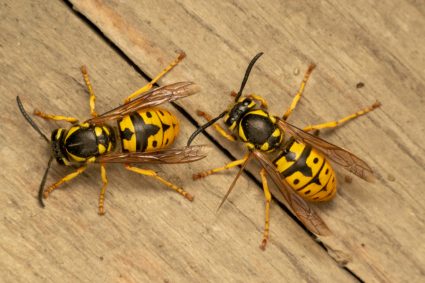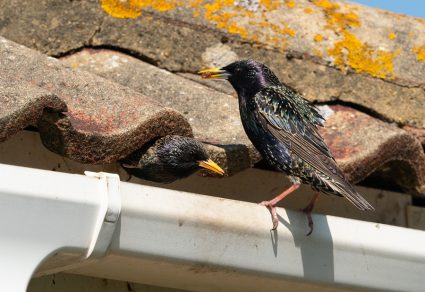
Japanese hornets, also known as Asian giant hornets (Vespa mandarinia), are the world’s largest hornet species, known for their distinctive coloring and aggressive behavior. While these insects play a crucial role in the ecosystem, they can pose a threat to humans and pets if they decide to create a nest in residential areas. In this comprehensive guide, we’ll explore effective methods on how to keep Japanese hornets away from your property.
To keep Japanese hornets away, secure food sources like compost piles and trash areas, plant wasp-repellent plants such as spearmint, thyme, and eucalyptus, use essential oils like lemongrass and peppermint, change outdoor light bulbs to yellow or sodium vapor lights, use a fake wasp nest, and apply preventative treatments like Sylo Insecticide and D-Fense Dust. If a nest is found, contact a professional pest control company for safe removal.
Understanding the Japanese Hornet
Before we dive into prevention and control measures, it’s important to understand the characteristics of Japanese hornets. Queens can reach up to 2.25 inches in length, while workers are about 1.5 inches long. They have a light shade of orange head, a dark brown thorax, and an abdomen with yellow and dark brown or black bands. Their large orange mandibles contain a black tooth used for digging. These hornets are native to East Asia but have been spotted in the Pacific Northwest of North America in recent years.
What Attracts Japanese Hornets?
Japanese hornets are attracted to larger insects, honey from honey bee colonies, tree sap, and certain baits like diluted millet jelly solution, crude sugar solution, vinegar, or fruit essence. Therefore, reducing access to these food sources can discourage their presence.
Effective Preventative Measures
There are several measures you can take to prevent a Japanese hornet infestation:
- Secure food sources: Keep your compost piles and trash areas secure. Store garbage in closed bins or cans to avoid attracting hornets.
- Plant wasp-repellent plants: Include plants such as spearmint, thyme, eucalyptus, wormwood, basil, bay leaves, lemongrass, and citronella grass near your home to deter hornets.
- Use essential oils: Mix a few drops of lemongrass, geranium, and clove essential oil in water to create a natural repellent. Alternatively, use peppermint oil, which hornets dislike.
- Change outdoor light bulbs: Hornets are attracted to regular outdoor light bulbs. Replace these with yellow or sodium vapor lights, which are less attractive to hornets.
- Use a fake wasp nest: Hornets are territorial and may avoid areas with existing nests.
- Apply preventative treatments: Discourage hornets from settling on your property with treatments like Sylo Insecticide and D-Fense Dust.
Identifying and Removing a Japanese Hornet Nest
If you find a Japanese hornet nest on your property, do not attempt to remove it yourself. Instead, call for help from a professional pest control company. They have the necessary experience, equipment, and protective gear to safely and effectively remove hornet nests.
Beware of Potential Dangers
Japanese hornets pose several potential dangers and health risks to humans. Their venom is more toxic than that of a honeybee, and due to their large size, they can deliver a larger dose of venom with each sting. A single sting from a Japanese hornet is rarely fatal, but it can cause severe pain and tissue damage, and in some cases, lead to kidney problems.
Conclusion
While Japanese hornets can pose a serious threat, with the right preventative measures and quick action, you can keep these pests at bay. Remember, it’s always safer to call a professional if you spot a nest or encounter a severe infestation.
Frequently Asked Questions
What time of year are Japanese hornets most active?
Japanese hornets are most active during the warmer months, typically from April to October. They are particularly aggressive during the late summer and early fall when they are searching for food to sustain their queen during the winter.
What should I do if I get stung by a Japanese hornet?
If you are stung by a Japanese hornet, you should clean the area with soap and water to prevent infection, apply a cold compress to reduce swelling, and take over-the-counter pain relievers. If you experience symptoms like difficulty breathing, nausea, or swelling of the face or mouth, seek immediate medical attention as these could be signs of an allergic reaction.
How can I identify a Japanese hornet?
Japanese hornets are distinctive in their appearance. They have a light shade of orange head, a dark brown thorax, and an abdomen with yellow and dark brown or black bands. Queens can reach up to 2.25 inches in length, while workers are about 1.5 inches long.
Can Japanese hornets fly at night?
Unlike many other wasp species, Japanese hornets can be active both day and night. However, they are primarily diurnal (active during the day) and tend to return to their nests at night.
Are there any natural predators of Japanese hornets?
Yes, there are a few natural predators of Japanese hornets, including some bird species and the Asian honey bee. Asian honey bees have developed a unique defense mechanism against Japanese hornets: when a hornet enters their hive, they swarm around it and vibrate, generating heat and carbon dioxide, which ultimately kills the hornet.


